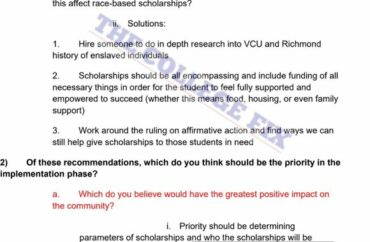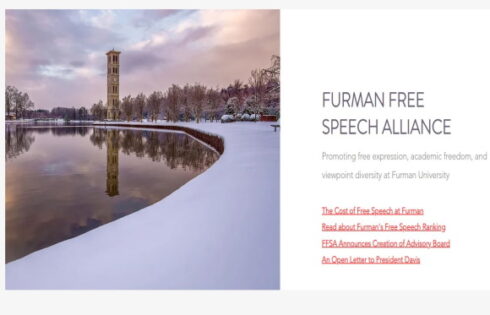
‘VCU is pushing political priorities over quality medical education,’ former Penn med school dean says
Virginia Commonwealth University School of Medicine explored ways to “work around the [Supreme Court] ruling on affirmative action” during the creation of a scholarship program, according to public records documents obtained by Do No Harm.
“VCU and other medical schools are trying their utmost to circumvent the Supreme Court decision striking down affirmative action,” Do No Harm Chairman Stanley Goldfarb told The College Fix via a media statement.
The documents his group obtained show the Project Gabriel Scholarships Workgroup discussing ideas over the summer, after the Supreme Court prohibited affirmative action in higher education.
Project Gabriel is a special commission that was created by VCU’s Office of the President to “heal the wounds caused by VCU’s historic ties to the institution of slavery.”
The scholarship would be available for “those with a historic connection to slavery.” A list of challenges included questions such as “How do you determine someone’s historic connection to slavery?” and “Restriction of affirmative action in college admission – how does this affect race-based scholarships?”
“Work around the ruling on affirmative action and find ways we can still help give scholarships to those students in need,” the obtained notes read.
Kevin Harris, the chief diversity officer at the medical school, did not respond to requests for comment sent in the past two weeks.
MORE: Ending affirmative action is ‘white supremacy,’ Democrats say
The Fix asked what the diversity statement entails, how VCU prioritizes diversity when making hiring decisions, and if the school is trying to work around the Students for Fair Admissions v. Harvard decision.
Goldfarb, a medical doctor and former associate dean of the University of Pennsylvania’s medical school, criticized the Virginia university’s approach.
“VCU’s thinly veiled approach includes mandated ‘diversity statements’ for job applications to affirm their commitment to DEI,” he told The Fix in his statement. “VCU is pushing political priorities over quality medical education.”
“They should focus on hiring the best candidates regardless of background,” he said. “They must make the quality of patient care for all patients their highest priority.”
But the documents show that race, sexuality, and DEI work are of high priority.
VCU medical school had spent months on its strategic diversity plan. A January 2023 email stated that all job applicants would need to submit a “diversity statement.”
The med school’s faculty affairs director Katherine Mulloy also asked all hiring committees to ensure they are sufficiently diverse. The “Strategic Recruitment Plan” for new hires would include assistance from the “Professional and Recruitment Inclusive Champion” according to one internal document.
There is also a box for the “search committee composition” to check boxes on representation, including gender – “identifies male, female, non-binary, genderqueer” as well as a separate box for race.
In case that did not capture it all, a free response box below asks hiring departments to list “how this committee offers diverse representation.”
One VCU diversity statement asks potential hires to discuss their “contributions to promoting diversity, inclusion and equity in their professional careers.”
According to the “Guidelines for Writing a Statement of Contributions to Diversity, Equity and Inclusion,” “VCU’s evaluation of a candidate’s Statement of Contributions to Diversity, Equity and Inclusion will be viewpoint-neutral.”
A “Diversity, Equity and Inclusion Statement Rubric” from the university says potential hires will be graded poorly if the applicant “participated in no specific [DEI] activities, or only one or two limited [DEI] activities” or fails to sufficiently express “knowledge of dimensions of diversity that result from different identities or perspectives.”
As part of the Strategic Recruitment Plan, the job advertisement and description must be “reviewed for diversity/inclusive language.”
Examples of this include “using gender-inclusive language such as “their” or “the incoming faculty,” rather than “his or her” or “she or he.”
Hiring teams should also not use language indicating they want “the ideal candidate,” the documents show.
MORE: UC Berkeley hired professors with enough DEI points, documents show
IMAGE: Virginia Commonwealth University School of Medicine
Like The College Fix on Facebook / Follow us on Twitter





Please join the conversation about our stories on Facebook, Twitter, Instagram, Reddit, MeWe, Rumble, Gab, Minds and Gettr.